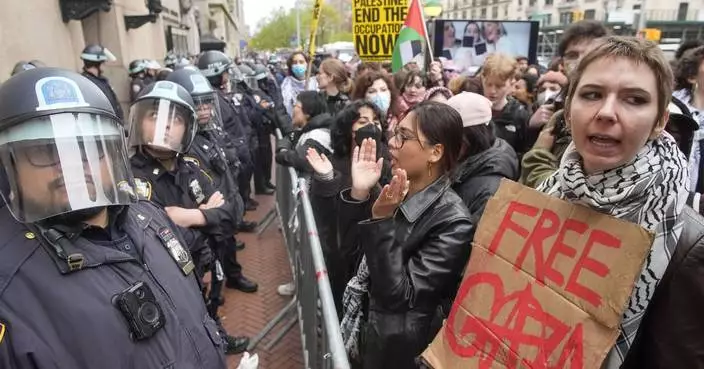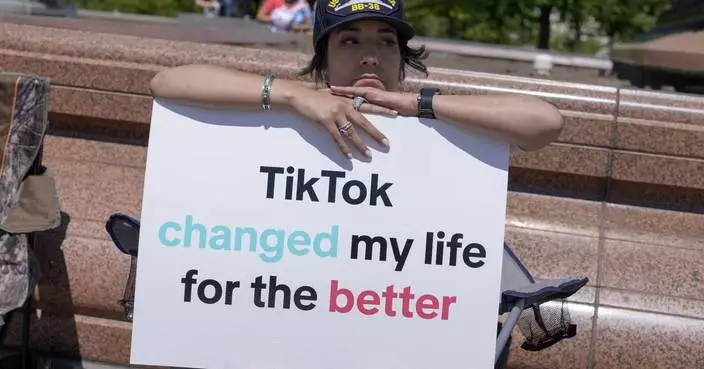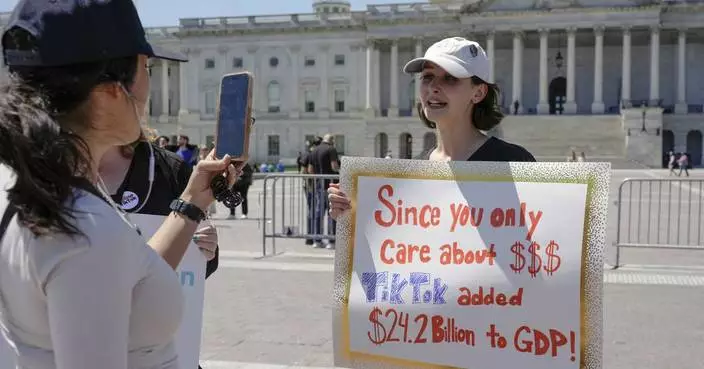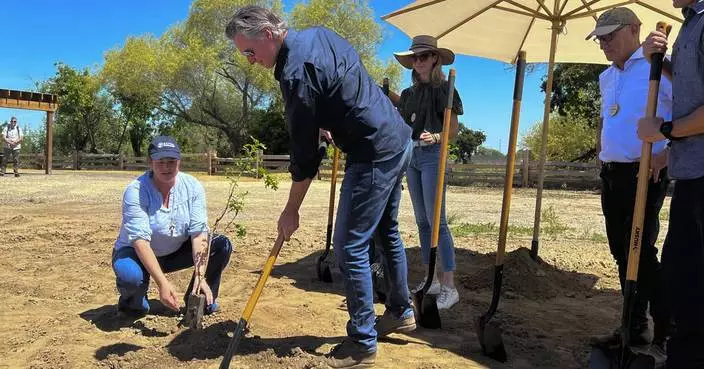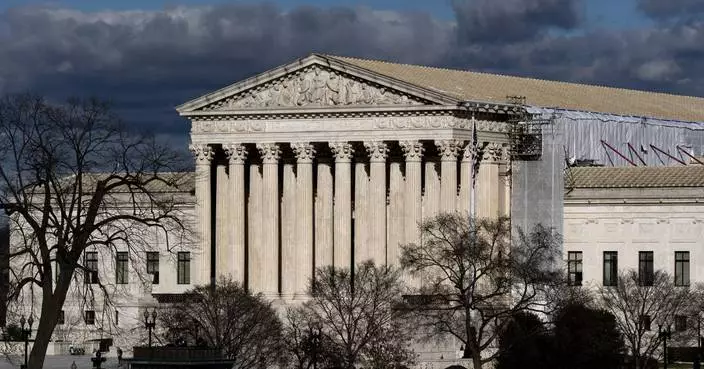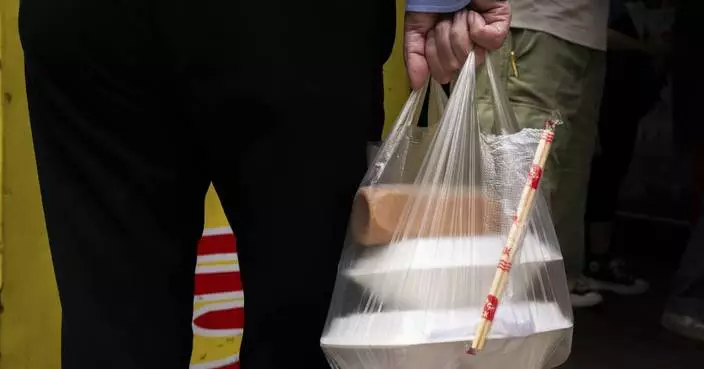A federal judge in California on Tuesday struck down the city of Oakland's ban on coal shipments at a proposed cargo terminal, siding with a developer who wants to use the site to transport Utah coal to Asia.
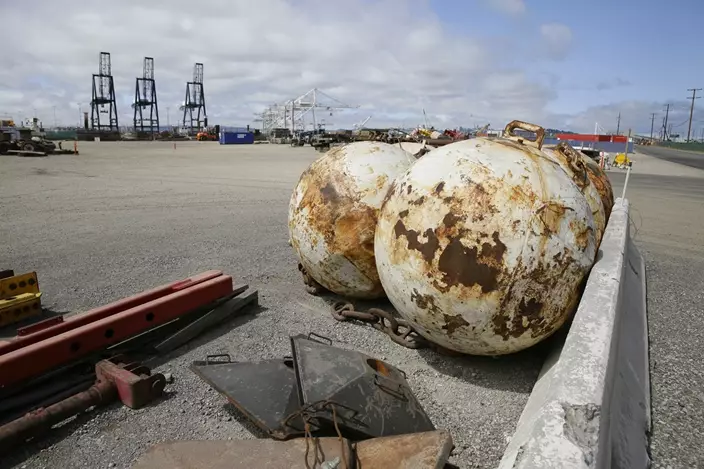
This Tuesday, May 24, 2016 file photo shows the former Oakland Army Base pier with the Port of Oakland in the background in Oakland, Calif. (AP Photo/Eric Risberg, File)
In a scathing ruling, U.S. District Judge Vince Chhabria in San Francisco said the information the city relied on to conclude that coal operations would pose a substantial health or safety danger to the public was "riddled with inaccuracies" and "faulty analyses, to the point that no reliable conclusion about health or safety dangers could be drawn from it."
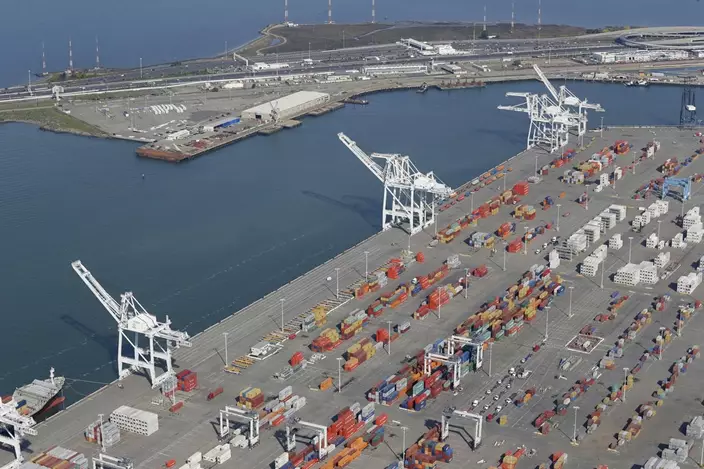
This Feb. 5, 2016 file photo shows the former Oakland Army Base pier at left and the Port of Oakland at lower right in Oakland, Calif. (AP Photo/Eric Risberg, File, File)
The decision cheered coal proponents while opponents said they would continue to fight for cleaner air. Oakland is reviewing its options and may appeal, said Justin Berton, a spokesman for Mayor Libby Schaaf.
The issue over coal has rocked then San Francisco Bay Area city that is environmentally friendly but also economically depressed in spots.
City leaders approved construction of a rail and marine terminal in 2013 as part of a larger makeover of an Army base that was shuttered in 1999. The $250 million project in west Oakland is expected to bring thousands of jobs to a historically African-American neighborhood that is among the poorest and most polluted in the region.
Oakland officials said coal was never mentioned as a possibility but lawyers for developers said city officials always knew there would be a mix of goods, including coal.
Concerned about pollution caused by coal dust, the city moved in 2016 to ban shipments of coal and petroleum coke, a solid derived from oil refining. The decision came after Utah lawmakers approved a $53 million investment to help ship the state's coal through Oakland to Asia.
Utah Sen. David Hinkins, a Republican who represents coal-producing counties, applauded the decision on Tuesday. "It would be good for my little depressed area," he said.
Many Utah mines are now shipping through Mexico to reach markets in Japan and Korea, as the U.S. market wanes, but a California shipping point would be closer and less expensive, he said.
Utah's $53 million would still be on the table, pending a committee approval, he said.
The government-watchdog group Alliance for a Better Utah, meanwhile, said they were disappointed in the ruling, and said the public money would be better spent on local water systems or fire trucks rather than the port.
In a statement, Schaaf vowed to continue the fight. Alex Katz, chief of staff to Oakland's city attorney, said they will discuss options with the City Council.
One of the developers of the project is Phil Tagami, a close friend of California Gov. and former Oakland Mayor Jerry Brown. The governor's environmental efforts have made him a global leader in the fight against climate change, but he hasn't spoken out publicly against the project.
Chhabria agreed with attorneys for developers that the city relied on a flawed analysis to justify its ban. As an example, he said the city failed to factor in covers on the coal-carrying rail cars in its emissions estimates for the project.
It also had no meaningful assessment of how emissions would affect air quality in Oakland, he said.
The city's opposition to coal operations appeared to stem largely from concerns about global warming, but it was "facially ridiculous to suggest that this one operation resulting in the consumption of coal in other countries will, in the grand scheme of things, pose a substantial global warming-related danger to people in Oakland," the judge said.
WASHINGTON (AP) — The Supreme Court hears arguments Thursday over whether Donald Trump is immune from prosecution in a case charging him with plotting to overturn the results of the 2020 presidential election.
It's a historic day for the court, with the justices having an opportunity to decide once and for all whether former presidents can be prosecuted for official acts they take while in the White House.
But between a decades-old court case about Richard Nixon, and an obscure constitutional provision about presidential impeachments, there are likely to be some unfamiliar concepts and terms thrown about.
Here are some tips to help follow everything:
The court marshal will bang the gavel at 10 a.m. EDT and Chief Justice John Roberts will announce soon after the start of arguments in Donald J. Trump vs. United States of America, as the case is called.
The session easily could last two hours or more.
There are no cameras in the courtroom, but since the pandemic, the court has livestreamed its argument sessions. Listen live on apnews.com/live/trump-supreme-court-arguments-updates or the court’s website at www.supremecourt.gov. C-SPAN also will carry the arguments at www.c-span.org.
Expect to hear talk about the impeachment process and the relationship, if any, to criminal prosecution.
Central to Trump's immunity argument is the claim that only a former president who was impeached and convicted by the Senate can be criminally prosecuted. Trump was impeached over his efforts to undo the election in the run-up to the violent riot at the U.S. Capitol on Jan. 6, 2021. But he was acquitted, not convicted, by the Senate in 2021.
Trump's lawyers cite as backup for their argument a provision of the Constitution known as the Impeachment Judgment Clause that says an officeholder convicted by the Senate shall nevertheless be “liable and subject to indictment, trial, judgment and punishment” in court.
Prosecutors say the Trump team is misreading the clause and that conviction in the Senate is not a prerequisite for a courtroom prosecution.
There's going to be plentiful discussion about Nixon but not necessarily for the reasons one might think.
Trump's team has repeatedly drawn attention to a 1982 case, Nixon v. Fitzgerald, in which the Supreme Court held that a former president cannot be sued in civil cases for their actions while in office. The case concerned the firing of an Air Force analyst, A. Ernest Fitzgerald, who testified before Congress about cost overruns in the production of a transport plane.
Fitzgerald's lawsuit against Nixon, president at the time of the 1970 termination, was unsuccessful, with Justice Lewis Powell writing for the court that presidents are entitled to absolute immunity from civil lawsuits for acts that fall within the “outer perimeter” of their official duties.
Importantly, that decision did not shield presidents from criminal liability, though Trump's team says the same analysis should apply.
Special counsel Jack Smith's team is also likely to bring up a separate Supreme Court decision involving Nixon that they say bolsters their case — a 1974 opinion that forced the president to turn over incriminating White House tapes for use in the prosecutions of his top aides.
Prosecutors have also noted that Nixon accepted rather than declined a subsequent pardon from President Gerald Ford — a recognition by the men, they say, “that a former President was subject to prosecution.”
The justices are known to love presenting hypothetical scenarios to lawyers as a way of testing the outer limits of their arguments. Expect that practice to be on full display Thursday as the court assesses whether former presidents are entitled to absolute immunity.
Already, Trump's lawyers have warned that if the prosecution is permitted to go forward, it would open the floodgates to criminal charges against other presidents, such as for authorizing a drone strike that kills a U.S. citizen or for giving false information to Congress that leads the country into war.
In a memorable moment during arguments in January before a federal appeals court, a judge asked a Trump lawyer whether a president who ordered a Navy SEAL to assassinate a political rival could be prosecuted.
Look for Smith's team to try to draw a sharp distinction between acts that it says are quintessential exercises of presidential power — such as ordering a drone strike during war — to the acts that Trump is accused of in this case, such as participating in a scheme to organize fake electors in battleground states. Those acts, prosecutors say, are personal acts and not presidential ones.
Associated Press writer Mark Sherman contributed to this report.
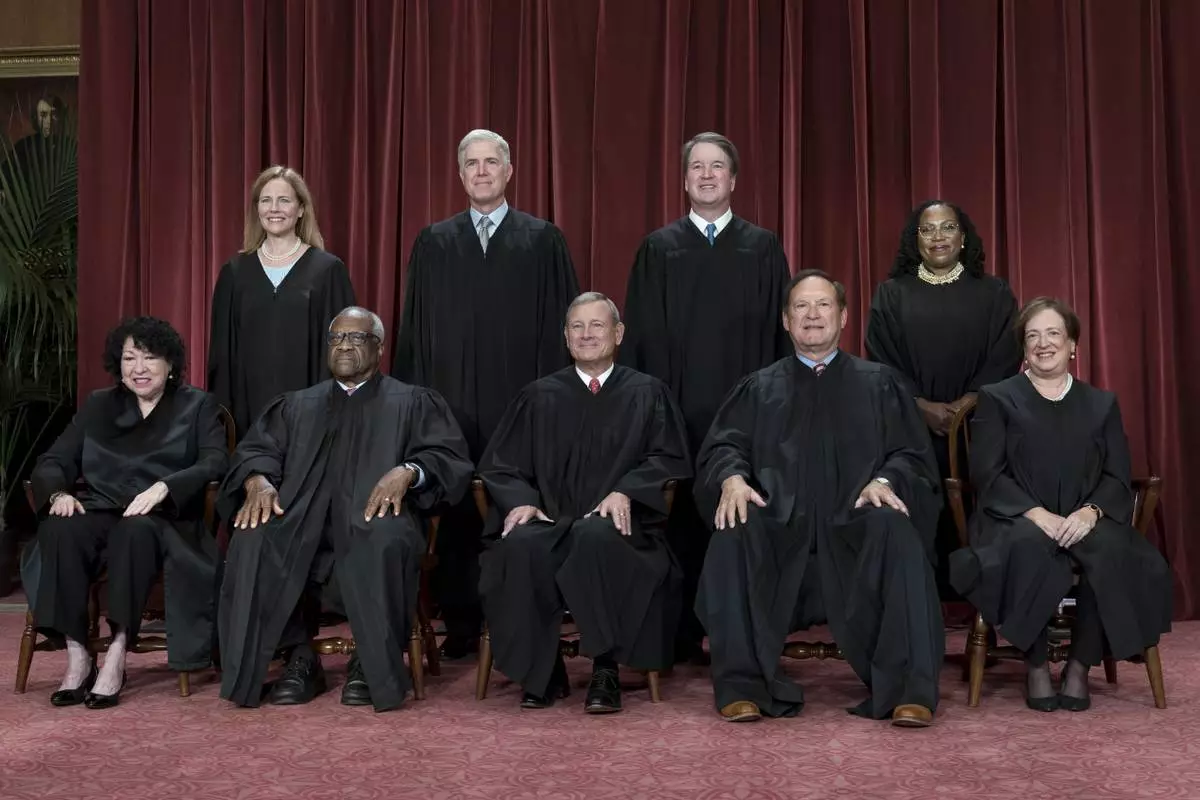
FILE - Members of the Supreme Court sit for a new group portrait following the addition of Associate Justice Ketanji Brown Jackson, at the Supreme Court building in Washington, on Oct. 7, 2022. Bottom row, from left, Associate Justice Sonia Sotomayor, Associate Justice Clarence Thomas, Chief Justice of the United States John Roberts, Associate Justice Samuel Alito, and Associate Justice Elena Kagan. Top row, from left, Associate Justice Amy Coney Barrett, Associate Justice Neil Gorsuch, Associate Justice Brett Kavanaugh, and Associate Justice Ketanji Brown Jackson. The core issue being debated before the Supreme Court on April 25, 2024, boils down to this: Whether a former president is immune from prosecution for actions taken while in office — and, if so, what is the extent of the immunity? (AP Photo/J. Scott Applewhite)
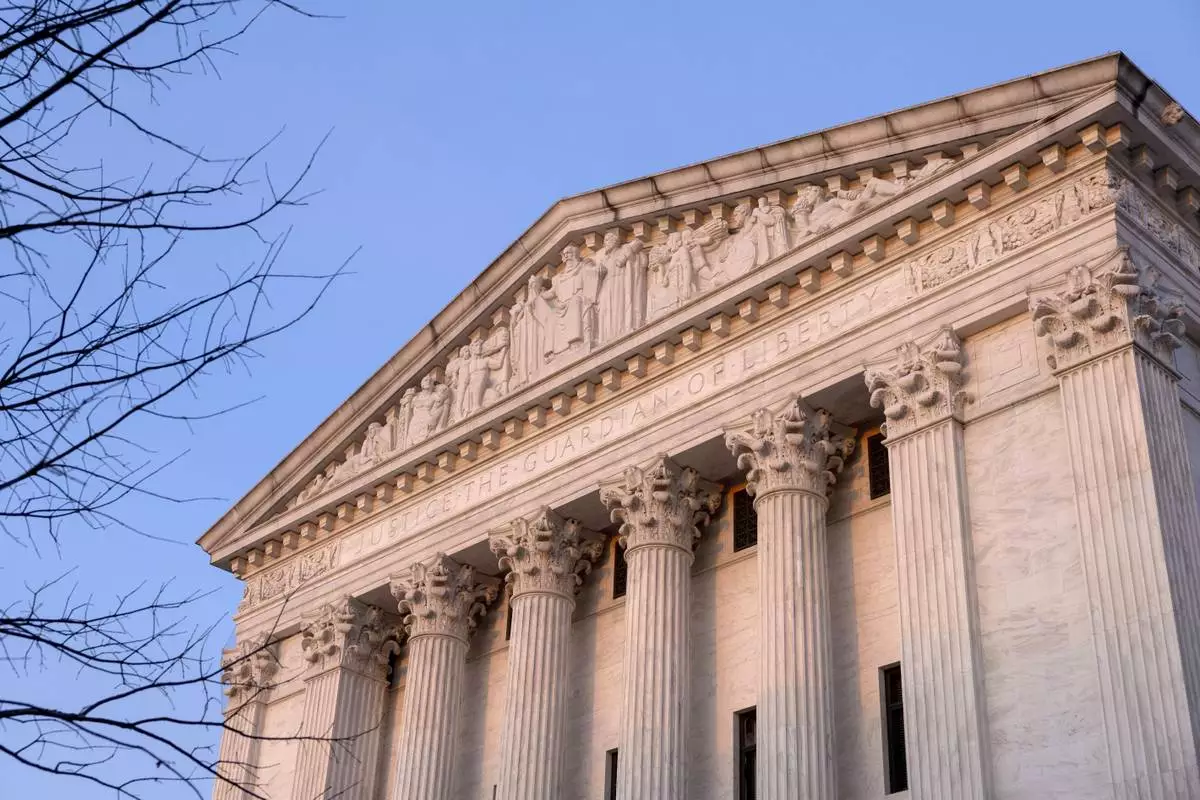
FILE - The Supreme Court of the United States is seen in Washington, March 26, 2024. The Supreme Court is hearing arguments this week with profound legal and political consequences: whether former President Donald Trump is immune from prosecution in a federal case charging him with plotting to overturn the results of the 2020 election. (AP Photo/Amanda Andrade-Rhoades, File)
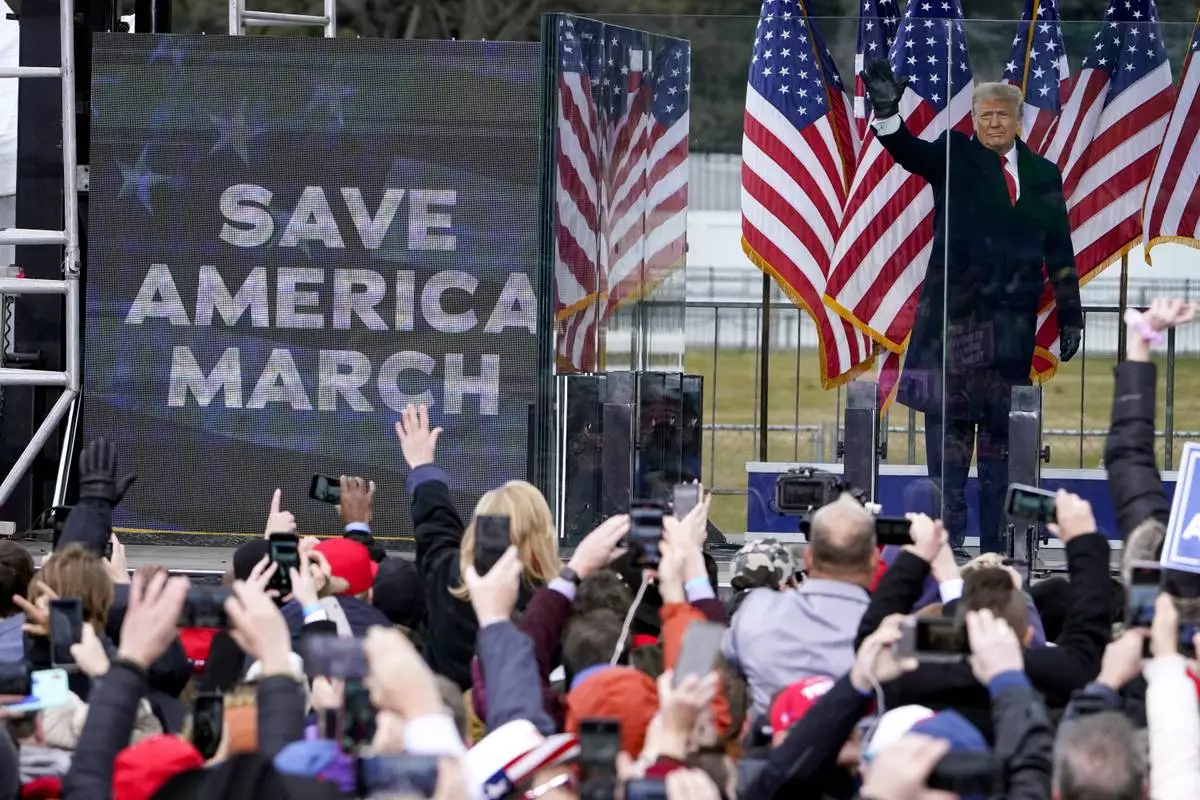
FILE - President Donald Trump arrives to speak at a rally in Washington, on Jan. 6, 2021. The Supreme Court will hear arguments over whether Trump is immune from prosecution in a case charging him with plotting to overturn the results of the 2020 presidential election. (AP Photo/Jacquelyn Martin, File)








